The Medical Bureau of Road Safety in Ireland is currently trialling the use of a breathalyser device that will stop a driver from starting a vehicle if their alcohol level is above the legal limit.
The Government asked a working group to consider introducing the alcohol interlock device.
The alcohol ignition interlock device was demonstrated at a 'Safe and Sober' conference in UCD in conjunction with the Road Safety Authority.
Once installed, at an initial cost of €1,000, a driver will not be able to start their vehicle if they are over the legal driving limit for alcohol.
Bus company Matthews Coach Hire installed the system for its drivers and has found that the device can detect the alcohol from mouthwash.
In Belgium, the device has been used as part of education and rehabilitation programmes for those who have drinking problems.
It is being considered for use instead of custodial sentences, whereby someone must prove they are sober before they can regain the use of their license or vehicle.
While it would be costly, the Medical Bureau of Road Safety is examining ways the device could be used more widely.

Director of the Bureau Professor Denis Cusack said: "In 2023, very sadly there were 188 deaths arising from road traffic crashes, the highest we've had since 2014 and statistically, probably about 55 of those deaths had alcohol as a contributing factor."
Minister of State at the Department of Transport Jack Chambers said he should receive the recommendations from the working group by March.
He said: "We want to be really ambitious in terms of embracing technology from a road safety perspective.
"We see this working very well across many European countries and we've got good examples already in the private sector with commercial buses, utilising this."
Mr Chambers said drink driving remains a major problem in Ireland.
"We know from the behavioural stories that as many as one in ten people are admitting to drink driving. Its completely unacceptable and presents serious road safety risks," he said.
There was a 20% increase in road fatalities last year and 11 people have already lost their lives on the roads this year, which is up on the same period last year.
"We've had a horrendous start to 2024 from a road safety perspective and we're keen to drive practical measures to try to break the trend this year," Mr Chambers said.
He said there is also worrying data on drug driving, which the Medical Bureau of Road Safety said can be much harder to detect.
Professor Cusack said: "Drugs are much more complex because we have several types of them and only some of them will actually be amenable to be tested in the breath.
"Others will still have to be done in oral fluid or saliva."
However, he added research is currently under way to see if cannabis can be measured in the breath but this is still a few years away.






